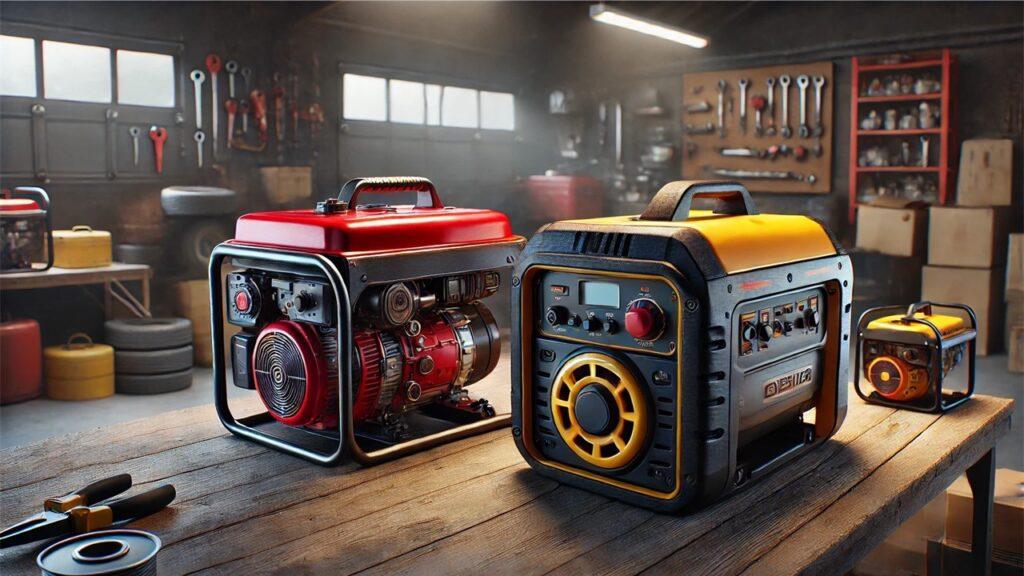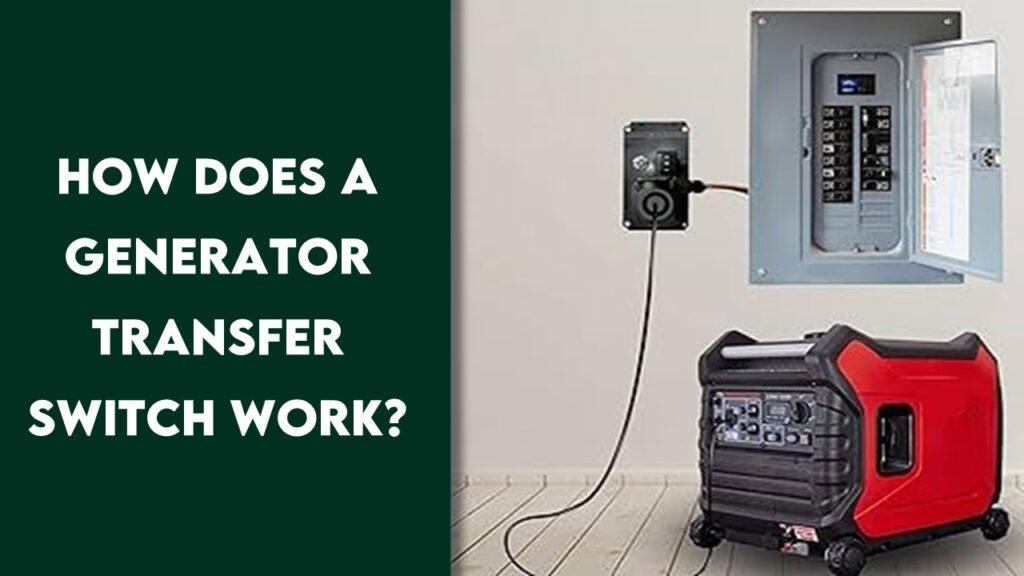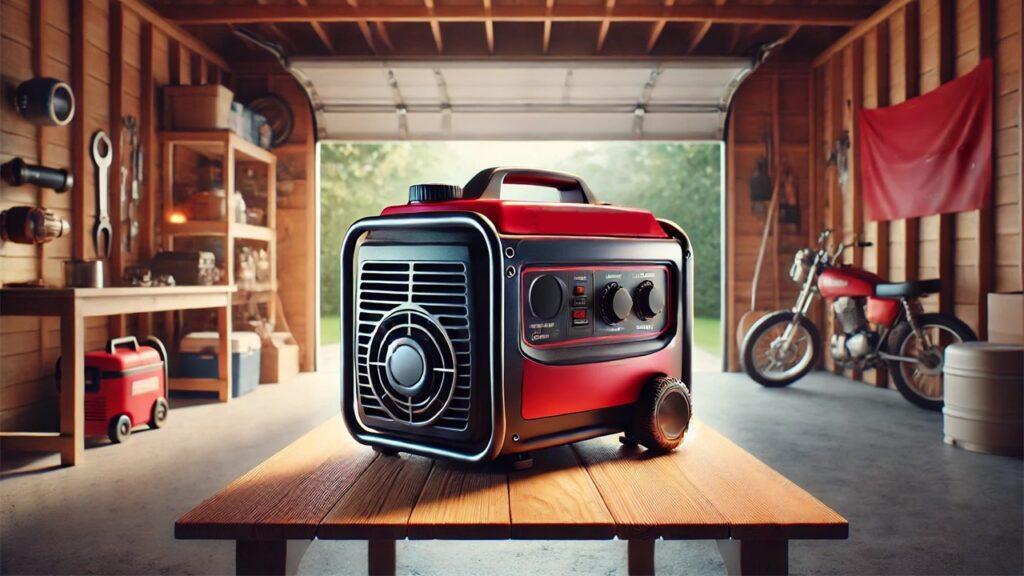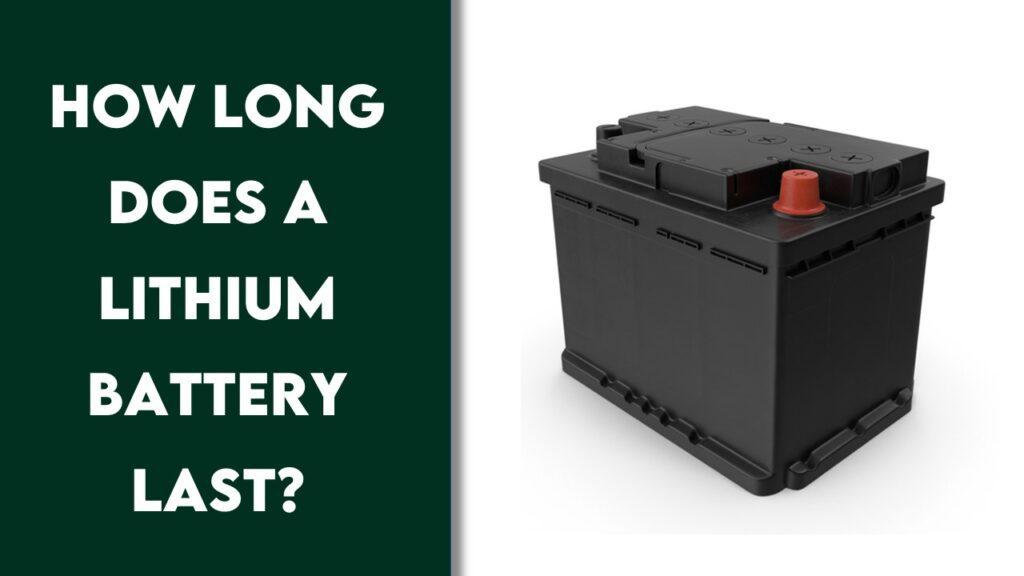RV Generator adapters are basically what you need to connect your generator to your RV and make sure everything runs smoothly without any power issues. In this guide, we have extensively researched, reviewed, and ranked the 8 best RV generator adapters in 2025.
We’re reader-supported. When you buy through links on our site, we may earn an affiliate commission. As an Amazon Associate, we earn from qualifying purchases.
Our Top 8 Picks of The Best RV Generator Adapters
1. Best Overall Option: RVGUARD 4 Prong
2. Best Budget Option: WEN GNA030
3. Value Option: Nilight RV Generator Adapter Cord
4. Heavy-Duty Option: CAMPELIFY RV Generator Power Adapter
5. Compact Option: Kohree 4 Prong
6. High-Power Option: S7 50 to 30 Amp RV Adapter
7. Waterproof Option: POWGRN RV 30 Amp to 110 Adapter
8. Versatile Option: Camco 55382 12″ 30Amp
What Is The Best RV Generator Adapter In 2025?
Finding the best generator adapters for RVs can feel challenging. With so many options, knowing what works best is key. Furthermore, the right adapter ensures safe and reliable power for your RV. Here is a carefully curated list of the best generator adapters for RVs in 2025:
1. Best Overall Option: RVGUARD 4 Prong
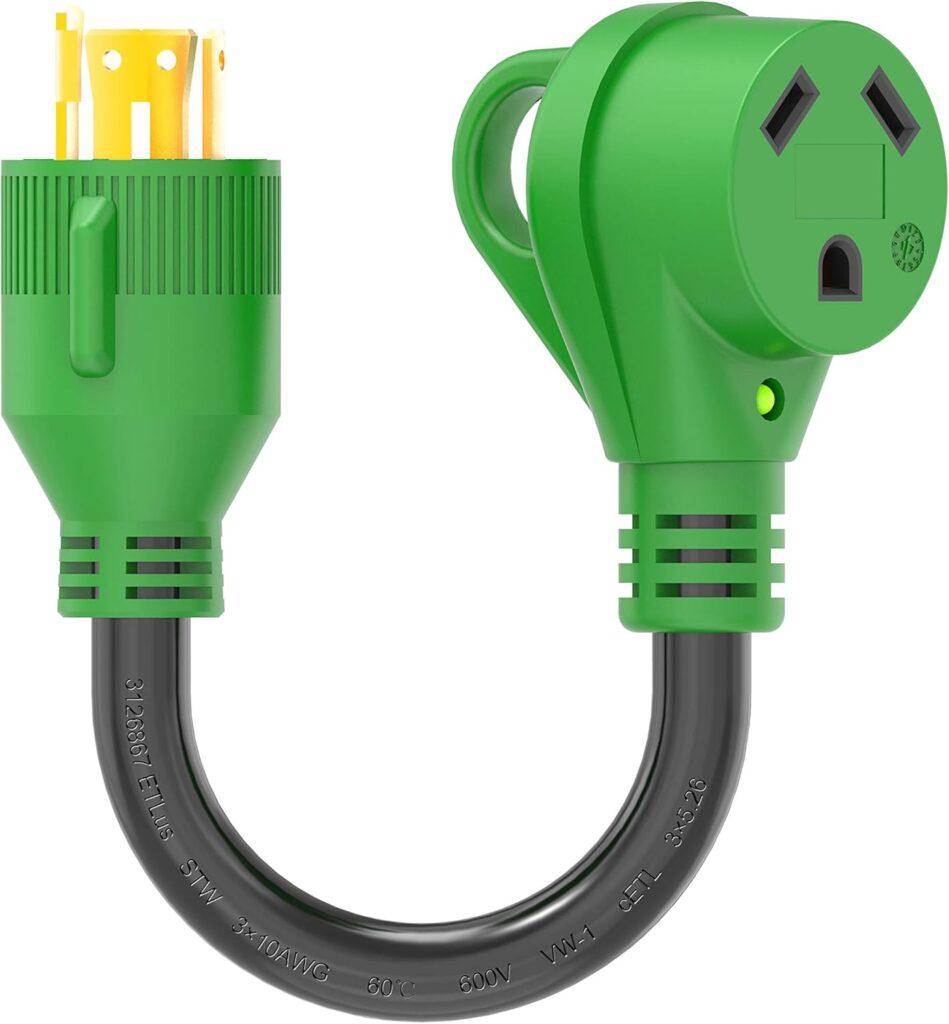
Key Specifications
- Brand: RVGUARD
- Voltage: 120/240V
- Input Current: 30 Amp
- Connector: L14-30P Locking Male to TT-30R Female
- Plug Type: 4-Prong Locking Male Plug
- Wattage: 3,600 Watts
- Number Of Conductors: 3
- Number of Outlets: 1
- Electrical Rating: 30 Amp
- Dimensions: 7.28 x 7.24 x 2.91 inches
- Cord Length: 12 inches
From our standpoint, this adapter does exactly what it should—makes it easy to connect a generator to a 30-amp RV. No fancy extras, no unnecessary gimmicks, just a well-built, solid adapter that gets the job done. The locking plug is a nice touch because it keeps things secure, so you don’t have to worry about it slipping out unexpectedly. The LED indicator is another practical feature, letting you know when the power is flowing instead of making you guess.
In our opinion, the durability stands out the most. It’s made with heavy-duty copper wiring, and the outer coating feels tough enough to handle weather, dirt, and constant use. The handle on the adapter is a small but useful addition, making it easier to plug in and unplug without having to wrestle with it. If you’re looking for a straightforward adapter that won’t cause headaches, this one is a proper pick.
Pros
- Locking plug keeps it firmly in place, preventing accidental disconnects
- LED power indicator makes it easy to tell if power is running
- Sturdy build with a weather-resistant, flame-retardant coating
- Handle makes plugging in and unplugging easier
Cons
- The 12-inch length might feel a little short for some setups
- Feels a bit stiff at first but becomes more flexible over time
In our view, this one makes sense for RV owners who want something reliable without overcomplicating things. The locking mechanism, sturdy construction, and easy-to-use design make it a practical choice. While the length could be a downside for some, it’s not a dealbreaker because it’s meant to be an adapter, not a long extension cord. From our perspective, this adapter checks the right boxes for convenience, durability, and ease of use.
2. Best Budget Option: WEN GNA030
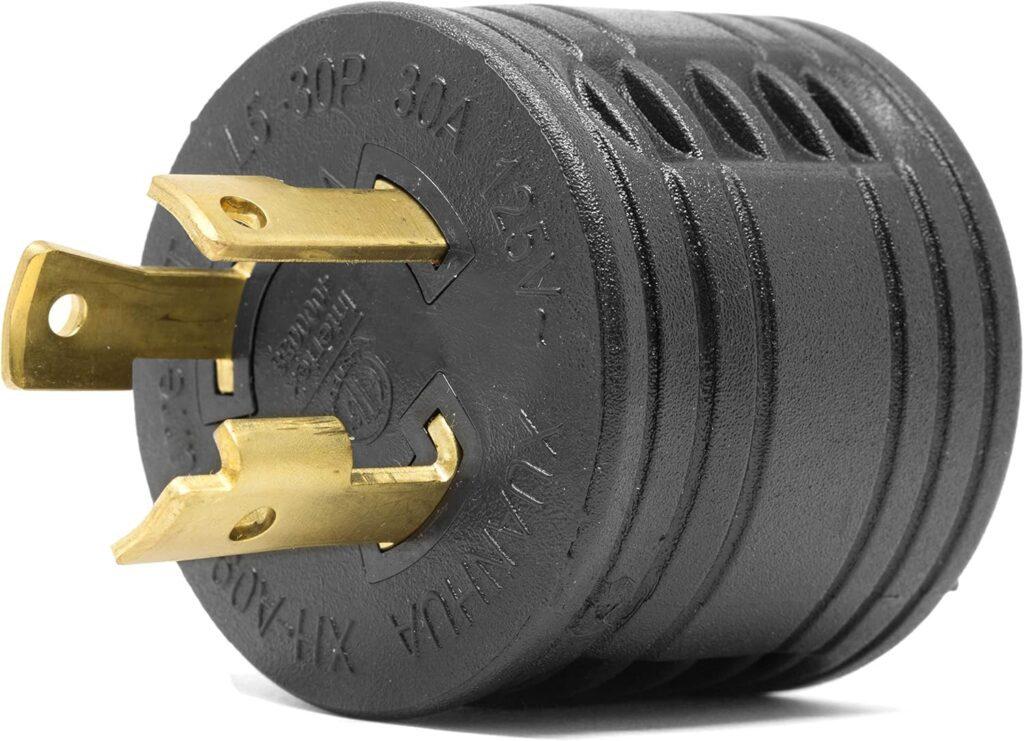
Key Specifications
- Brand: WEN
- Voltage: 120 Volts
- Input Current: 30 Amp
- Connector: NEMA L5-30P Twist-Lock to TT-30R Outlet
- Plug Type: NEMA L5-30P Twist-Lock
- Wattage: 3,600 Watts
- Number Of Conductors: 3
- Number of Outlets: 1
- Electrical Rating: 30 Amp
- Dimensions: 2.75″D x 2.25″W x 2.25″H
- Cord Length: Compact plug-in adapter (no extended cord)
From our standpoint, this is a simple, no-fuss adapter that does exactly what it should—convert your generator’s L5-30P twist-lock plug into an RV-ready TT-30R outlet. It’s compact, easy to carry, and fits snugly without any hassle. If you have a WEN generator or any compatible model, this adapter makes setting up power for your RV quick and effortless.
In our opinion, the design is well thought out. The non-slip grooves make it easy to plug in and remove, and the durable brass and plastic materials ensure it holds up well over time. It doesn’t have extra features, but it doesn’t need to. If you just need a solid, affordable adapter that gets the job done without taking up extra space, this one is a proper fit.
Pros
- Compact and lightweight, making it easy to store and carry
- Twist-lock plug stays firmly in place, preventing accidental disconnections
- Simple plug-and-play setup, no complicated wiring or installation
- Non-slip grooves make plugging in and unplugging hassle-free
Cons
- No LED power indicator, so you have to check manually for power
- Works great for WEN generators but may not fit all models perfectly
From our perspective, the WEN GNA030 is a practical option for RV owners looking for a straightforward and budget-friendly generator adapter. It’s compact, easy to use, and built for those who just need a reliable connection without unnecessary extras. While it doesn’t have fancy features, it delivers where it counts—secure fit, durability, and effortless setup. If you want something simple and effective, this adapter is an excellent choice.
3. Value Option: Nilight RV Generator Adapter Cord

Key Specifications
- Brand: Nilight
- Voltage: 125 Volts
- Input Current: 30 Amp
- Connector: Male-to-Female
- Plug Type: NEMA L5-30P to NEMA TT-30R
- Wattage: 3,750 Watts
- Number Of Conductors: 3
- Number of Outlets: 1
- Electrical Rating: 30 Amp
- Dimensions: 14.3 inches in length
- Cord Length: 14.3 inches
From our standpoint, this Nilight adapter cord is a solid pick for anyone needing a sturdy, well-built connection between their generator and RV. The pure copper wiring ensures reliable conductivity, and the twist-lock male plug adds extra security, keeping everything firmly in place. It’s long enough for easy use but still compact enough for convenient storage.
In our opinion, one of its strongest points is its weather-resistant PVC sheath. It feels like it’s made to handle the wear and tear of outdoor conditions, from rain to extreme heat. Plus, it’s flexible enough to maneuver without feeling flimsy. If you’re after an adapter that balances performance, durability, and ease of use, this one hits the right spot.
Pros
- Secure twist-lock plug keeps the connection stable even with movement
- Heavy-duty construction with pure copper wiring for better power flow
- Weather-resistant coating protects against rain, snow, and extreme conditions
- Good flexibility for easy handling and setup
Cons
- A bit bulkier than some adapters, but still manageable for storage
- No LED power indicator, so you need to check power manually
From our perspective, this Nilight adapter cord is a reliable and well-built option for RV owners who want something dependable without breaking the bank. It locks in securely, holds up well in tough conditions, and provides steady power without issues. While it doesn’t have extra bells and whistles, it does what it’s supposed to with a focus on safety and durability, making it an excellent pick for those who need a long-lasting, everyday adapter.
4. Heavy-Duty Option: CAMPELIFY RV Generator Power Adapter

Key Specifications
- Brand: CAMPELIFY
- Voltage: 125 Volts
- Input Current: 50 Amp
- Connector: Male-to-Female
- Plug Type: NEMA L14-30P to NEMA 14-50R
- Wattage: 3,750 Watts
- Number Of Conductors: 2
- Number of Outlets: 1
- Electrical Rating: 30 Amp
- Dimensions: 12 inches in length
- Cord Length: 12 inches
From our standpoint, this CAMPELIFY RV generator adapter is built for those who need a tough and reliable power connection between their generator and RV. The heavy-duty copper wiring ensures a strong electrical flow, while the twist-lock male plug provides a secure fit, so there’s no risk of it slipping out. It’s short and compact, making it easy to store while still being sturdy enough for regular outdoor use.
In our opinion, one of the standout features of this generator adapter for RV is the reinforced PVC coating, designed to handle rough outdoor conditions. It’s thick enough to protect the internal wiring while remaining flexible enough for easy handling. The built-in handle also makes plugging and unplugging easier, which is a small but helpful touch. If you’re looking for a sturdy and well-made RV generator adapter that doesn’t feel flimsy, this one delivers.
Pros
- Secure twist-lock plug prevents accidental disconnections
- Heavy-duty copper wiring ensures stable power flow
- Thick, weather-resistant PVC coating adds durability for outdoor use
- Easy-grip handle makes plugging and unplugging hassle-free
Cons
- The 12-inch length might be too short for some setups
- A bit bulkier than standard generator adapters for RV, but that adds to its durability
From our perspective, the CAMPELIFY RV generator power adapter is a solid and dependable option for RV owners who need a rugged and long-lasting generator adapter. It’s built with high-quality materials, offers a secure connection, and holds up well in various weather conditions. While it’s slightly bulkier than some alternatives, it makes up for that with its durability and reliability, making it an excellent pick for heavy-duty use.
5. Compact Option: Kohree 4 Prong
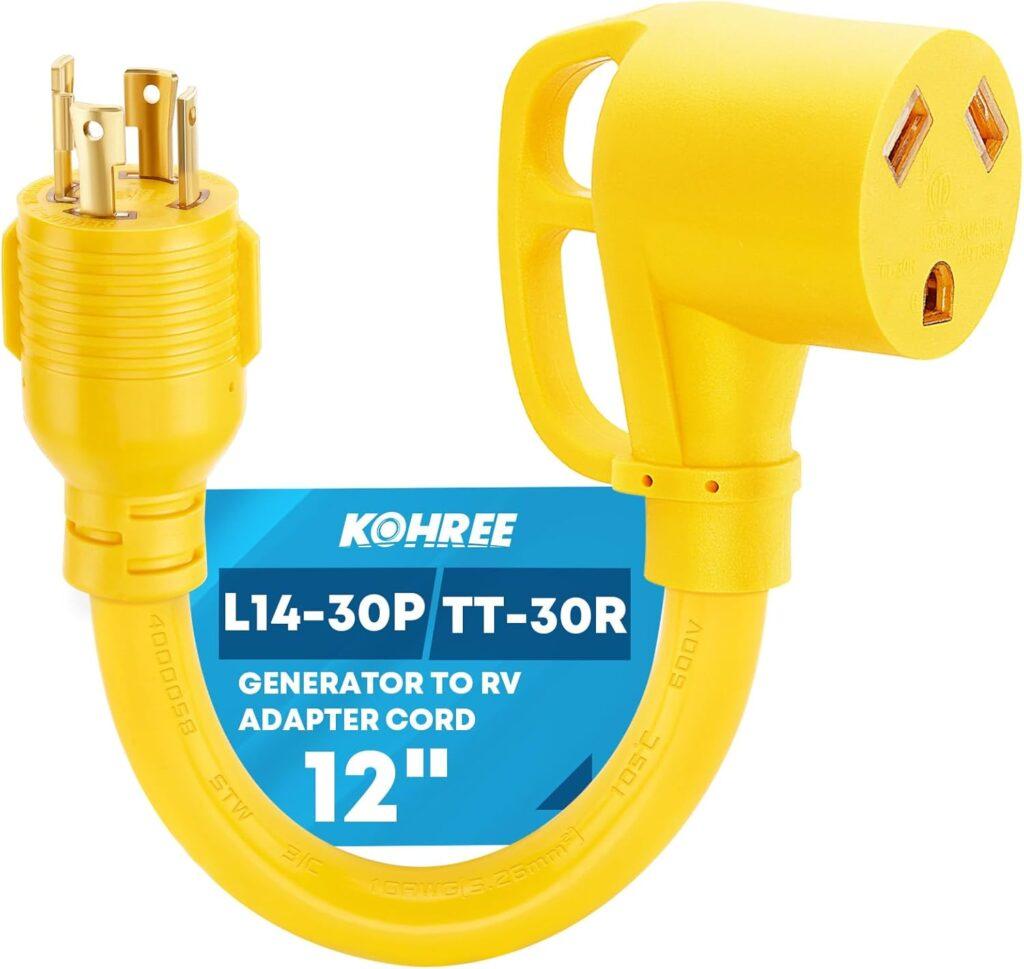
Key Specifications
- Brand: Kohree
- Voltage: 125 Volts
- Input Current: 30 Amp
- Connector: Male-to-Female
- Plug Type: NEMA L14-30P to NEMA TT-30R
- Wattage: 3,750 Watts
- Number Of Conductors: 3
- Number of Outlets: 1
- Electrical Rating: 30 Amp
- Dimensions: Compact plug-in adapter
- Cord Length: 12 inches
From our standpoint, the Kohree 4 prong generator adapter for RVs is a solid and compact solution for connecting a generator to an RV. The twist-lock male plug keeps everything securely in place, reducing the risk of accidental disconnections. It’s small, making it easy to store, but still built with heavy-duty copper wiring for steady power flow.
In our opinion, the flexibility and durability of this RV generator adapter make it a practical option for outdoor use. The PVC-coated jacket helps protect against wear and tear, while the easy-grip design makes plugging and unplugging effortless. If you need something small yet dependable, this adapter delivers a proper balance of portability and functionality.
Pros
- Compact and lightweight, making it easy to store and carry
- Secure twist-lock connection ensures a stable power supply
- Heavy-duty copper wiring for reliable and consistent performance
- PVC-coated exterior protects against outdoor elements
Cons
- No LED power indicator, so you have to check power manually
- 12-inch length is great for portability but may not work for all setups
From our perspective, the Kohree 4 prong generator adapter for RVs is a great fit for those who prioritize portability and reliability. It’s built to handle outdoor conditions, offers a secure connection, and doesn’t take up much space. While it may lack extra features like an LED indicator, it makes up for it with durability and ease of use, making it an excellent choice for compact setups.
6. High-Power Option: S7 50 to 30 Amp RV Adapter
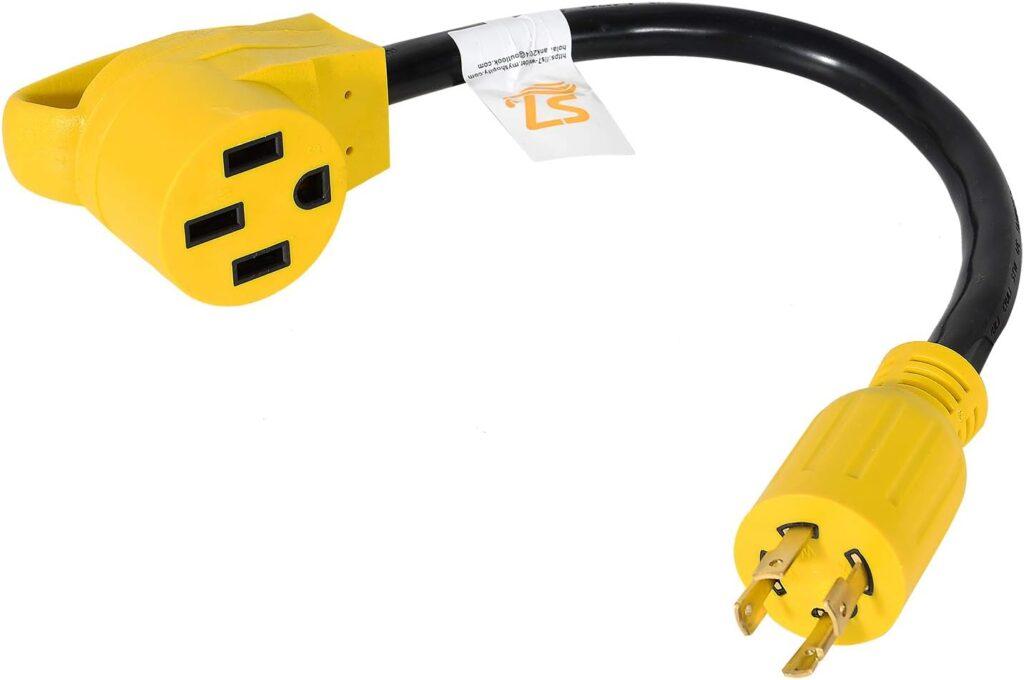
Key Specifications
- Brand: S7
- Voltage: 250 Volts
- Input Current: 30 Amp
- Connector: Male-to-Female
- Plug Type: NEMA 14-50
- Wattage: 7,500 Watts
- Number Of Conductors: 4
- Number of Outlets: 1
- Electrical Rating: 30 Amp
- Dimensions: 21.6 inches in length
- Cord Length: 1.8 feet
From our standpoint, this S7 generator adapter for RVs is a solid option for those who need a higher power connection without complications. The heavy-duty copper wiring ensures a steady flow of electricity, while the flame-retardant PVC coating protects against wear and outdoor conditions. It’s long enough to provide flexibility but still compact enough to store easily.
In our opinion, the ergonomic handle design makes a real difference when plugging and unplugging. The secure twist-lock connection prevents accidental disconnections, which is especially useful for RV owners dealing with high-power setups. If you need a durable and high-capacity adapter for your generator and RV, this one is a proper choice.
Pros
- Secure twist-lock plug keeps the connection stable during use
- Heavy-duty copper wiring ensures efficient power transfer
- PVC-coated exterior protects against heat, moisture, and wear
- Ergonomic handle design makes plugging and unplugging effortless
Cons
- Slightly bulkier than standard RV generator adapters due to its higher power capacity
- No LED indicator, so you have to check the power manually
From our perspective, the S7 50 to 30 amp RV adapter is a strong and reliable option for those who need a high-capacity, well-built power connection. It provides secure, stable power, handles tough outdoor conditions, and is easy to use. While it’s a bit larger than some other RV generator adapters, the durability and performance make it a great fit for high-power setups.
7. Waterproof Option: POWGRN RV 30 Amp to 110 Adapter
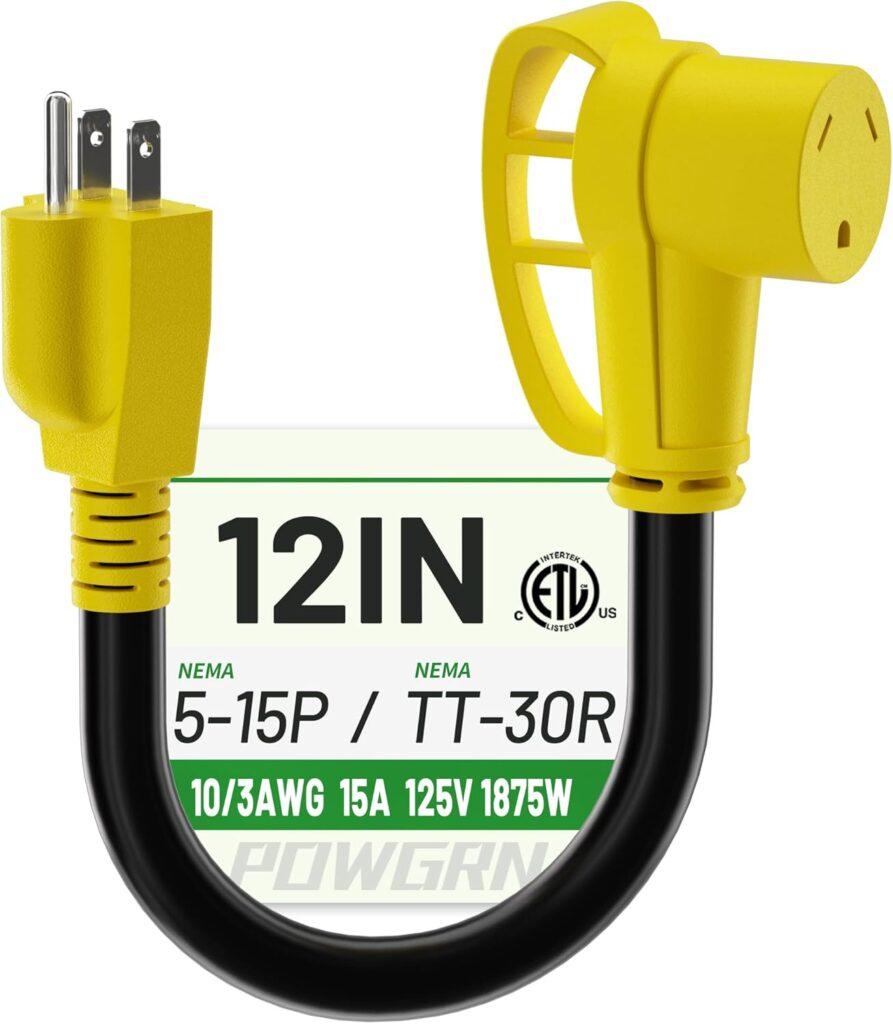
Key Specifications
- Brand: POWGRN
- Voltage: 125 Volts
- Input Current: 15 Amp
- Connector: Male-to-Female
- Plug Type: Type B
- Wattage: 1,875 Watts
- Number Of Conductors: 3
- Number of Outlets: 1
- Electrical Rating: 30 Amp to 110 Amp
- Dimensions: Compact plug-in adapter
- Cord Length: 12 inches
From our standpoint, this POWGRN adapter is a great choice for those who need a weather-resistant and waterproof solution for their RV power setup. The heavy-duty PVC coating ensures durability against rain, snow, and extreme temperatures. The ergonomic grip handles make plugging and unplugging hassle-free, even in wet or slippery conditions.
In our opinion, the high-conductivity copper wiring makes a noticeable difference in power stability. The adapter works well when transitioning from a 15-amp to a 30-amp connection, making it useful in multiple settings. If you often camp in areas with unpredictable weather, this rugged and well-built adapter is a reliable option.
Pros
- Waterproof and weather-resistant, making it ideal for outdoor use
- Heavy-duty copper wiring ensures efficient power flow
- Ergonomic grip handles make plugging and unplugging easier
- Thick PVC sleeve protects against wear and tear
Cons
- Limited to 1,875 watts, so it won’t work for high-power appliances
- Slightly bulkier than some other RV generator adapters
From our perspective, the POWGRN RV generator adapter stands out for its waterproof and weather-resistant design. It’s built for durability, handles outdoor elements well, and provides a secure power connection. While it has a lower wattage than some other options, it works reliably for lighter RV power needs, making it a great choice for campers who need protection against the elements.
8. Versatile Option: Camco 55382 12″ 30Amp
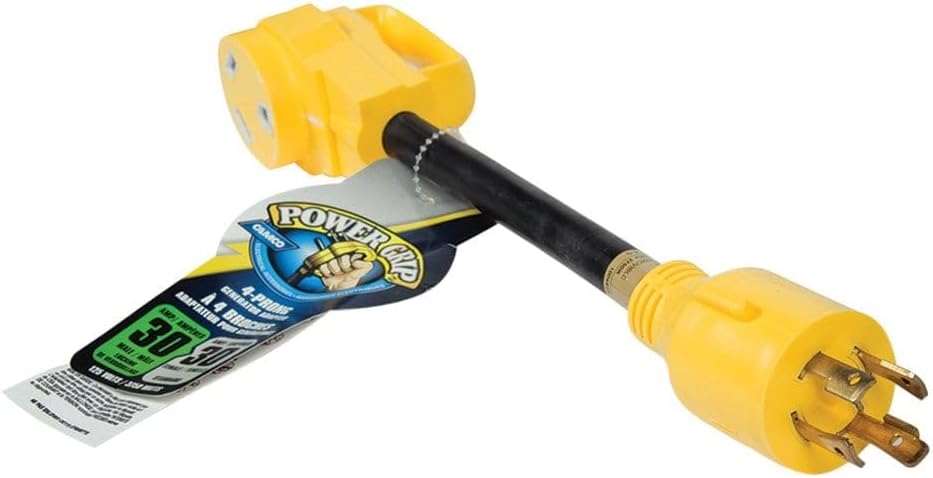
Key Specifications
- Brand: Camco
- Voltage: 125 Volts
- Input Current: 30 Amp
- Connector: Male-to-Female
- Plug Type: L14-30 locking plug to TT-30 receptacle
- Wattage: 3,750 Watts
- Number Of Conductors: 4
- Number of Outlets: 1
- Electrical Rating: 30 Amp
- Dimensions: Compact rectangular shape
- Cord Length: 12 inches
From our standpoint, this Camco generator adapter for RVs is a practical and well-designed option for RV owners who want a reliable power connection. The L14-30 locking plug ensures a secure fit, preventing accidental disconnections, while the TT-30 receptacle makes it easy to connect to a standard RV power cord. It’s built to handle 3,750 watts, which is enough to run essential appliances like an air conditioner, fridge, or microwave.
In our opinion, one of the standout features is the PowerGrip handle, which makes unplugging effortless. It’s a small detail, but it adds to the overall convenience, especially for those who struggle with tight connections. If you’re looking for a sturdy, compact adapter that works well in different RV setups, this one is a proper fit.
Pros
- Secure locking plug keeps the connection stable
- PowerGrip handle makes unplugging easier
- Compact size makes storage simple
- Sturdy construction for long-term use
Cons
- No LED power indicator to show when power is active
- The 12-inch length might not be ideal for every setup
From our perspective, the Camco 55382 generator adapter is a well-rounded and reliable choice for RV owners. It’s versatile, easy to use, and built with a strong grip design that makes handling effortless. While it doesn’t have extra features like an LED indicator, it delivers a secure and efficient power connection, making it a great fit for different RV power needs.
How the Generator Adapters for RV Were Tested
To determine the best RV generator adapters, various factors were evaluated to ensure they meet the practical needs of RV owners. The testing process combined hands-on trials, expert reviews, and insights from customer feedback on forums.
Testing Criteria:
- Compatibility: Each adapter was tested with multiple RV and generator plug types to check for proper fit and functionality.
- Durability: Adapters were exposed to different weather conditions and physical stress to evaluate their build quality.
- Power Handling: Tested for wattage capacity to ensure they could safely handle RV power requirements without overheating.
- Ease of Use: Assessed for how simple they were to connect and disconnect, even for first-time users.
- Customer Feedback: Reviews and discussions on RV forums were analyzed to understand real-world performance and reliability.
- Safety Features: Verified if adapters were UL-listed or had additional protections like weatherproof coatings.
Customer reviews and feedback played a key role in highlighting long-term usability and uncovering potential issues. By combining practical tests with real-world experiences, the adapters that performed best offered durability, compatibility, and safety.
What Are RV Generator Adapters?
Generator adapters for RVs are those little gadgets that make sure your RV and generator actually work together. They connect the plugs that don’t naturally match up, so you can get power flowing without a headache. If you’re out camping or parked at a site with different hookups, these adapters keep your setup running smoothly. Without them, you’re likely dealing with mismatched plugs or no power at all—and no one wants that on a trip.
Why Are RV Generator Adapters Essential for RV Owners?
Let’s be real—RVs and generators don’t always come with matching plugs. If you don’t have the right adapter, you could be stuck without power for your fridge, AC, or even basic charging. A generator adapter is what connects the two and keeps your appliances running, which is pretty much a no-brainer if you want to stay comfortable on the road.
It’s also about flexibility. Not all campgrounds or generators have the same kind of power setup, and that’s where an adapter makes all the difference. You can connect to whatever’s available without worrying about compatibility issues. It’s like having a tool in your kit that makes sure you’re prepared for whatever situation pops up.
And honestly, they’re just super convenient. They’re small, easy to carry, and don’t take much effort to use. For something so simple, they solve a big problem. If you’re serious about RVing, it’s one of those things you don’t realize you need until you do.
Types of RV Generator Adapters
Generator adapters for RVs come in different types to match the unique power needs and plug configurations of various setups. Understanding the differences can save you time, effort, and frustration while on the road.
What Are 30-Amp Generator Adapters?
A 30-amp generator adapter is one of the most common options for RV owners, especially those with smaller rigs. These adapters are designed to handle up to 3,600 watts of power and typically feature a three-prong plug. If your RV has a 30-amp electrical system, this adapter will connect seamlessly to compatible generators or power sources. They’re ideal for running essential appliances like a fridge, lights, and small air conditioners but may not support multiple high-power devices simultaneously.
What Are 50-Amp Generator Adapters?
50-amp generator adapters are built for larger RVs with greater power demands. These adapters can handle up to 12,000 watts, making them perfect for RVs with multiple air conditioners, washers, dryers, and other heavy-duty appliances. The plugs have four prongs, providing two separate 120-volt circuits. If you’ve got a bigger RV or more appliances to power, this is the adapter to use. However, it’s important to match your RV’s system to avoid overloading.
How Do 30-to-50 Amp Adapters Work?
A 30-to-50 amp adapter is a lifesaver when you need to connect a 30-amp power source to a 50-amp RV, or vice versa. These adapters convert the available power to fit your RV’s system, though they don’t increase the total wattage. For instance, if you’re using a 30-to-50 amp adapter, your RV will still only draw 30 amps of power. They’re great for flexibility but should be used cautiously to avoid overloading circuits or appliances.
Specialty Generator Adapters for RVs
Specialty generator adapters are designed for unique situations where standard adapters don’t work. These include Y-splitters, which allow you to connect two smaller outlets to power your RV, and dogbone adapters, which offer added flexibility for tight or awkward spaces. Some specialty adapters are even built for international travel, ensuring compatibility with non-standard outlets. While not always necessary, having one or two specialty adapters can prepare you for unexpected power setups.
Key Features to Look for When Buying RV Generator Adapters
Choosing a generator adapter for your RV isn’t just a simple task. It requires understanding the specific needs of your RV, the safety standards of the adapter, and how well it matches your generator. Let’s break down the key features to consider to help you make an informed choice.
What Is Your RV’s Power Requirement?
Knowing your RV’s power requirements is crucial for selecting the right adapter. RVs generally come with either a 30-amp or 50-amp electrical system, and the adapter you choose must align with this setup to work effectively.
Steps to Determine Your Power Requirement:
Check Your RV’s Amp Rating: This is usually listed in your RV’s user manual or on the power panel. Most smaller RVs operate on 30 amps, while larger, luxury models use 50 amps.
Calculate Wattage Needs: Use the formula:
Watts = Volts × Amps
For Examples, a 30-amp RV operating at 120 volts:
Watts = 120 volts × 30 amps = 3,600 watts
This means the adapter and generator must handle up to 3,600 watts to power the RV efficiently.
A 50-amp RV has two separate 120-volt circuits:
Watts = 120 volts × 50 amps × 2 = 12,000 watts
This higher wattage capacity allows for running multiple appliances like air conditioners, refrigerators, or even a washer and dryer simultaneously.
Knowing these calculations ensures that the adapter won’t overload or fail when powering your RV. Selecting the right adapter based on wattage keeps your appliances running smoothly and avoids unnecessary power interruptions.
Why Compatibility with the Generator Outlet Matters
Not all generator outlets are created equal, and the last thing you want is to find out your adapter doesn’t fit when you need it most. Ensuring compatibility between your generator and RV adapter is essential for a seamless connection.
What to Check for Compatibility:
- Generator Plug Type: Generators come with different outlet types, such as three-prong, four-prong, or twist-lock plugs. Identify your generator’s outlet before purchasing an adapter.
- Adapter Prong Configuration: Match the adapter’s prongs to your RV’s plug system. For example, a 30-amp adapter will have a three-prong plug, while a 50-amp adapter uses a four-prong plug.
- Universal Adapters: If you frequently use different power sources, consider an adapter with universal compatibility for added flexibility.
- Avoid Mismatched Connections: Using an adapter that doesn’t properly match can result in power surges, blown circuits, or even damage to your RV’s electrical system.
Choosing the right adapter for your generator’s outlet eliminates the hassle of trying to make mismatched connections work. It also prevents potential safety risks or damage to your RV’s appliances.
How to Ensure Safety When Choosing Adapters
Safety should be your top priority when selecting a generator adapter for your RV. A poor-quality adapter can lead to electrical hazards, equipment failure, or worse.
Safety Features to Look For:
- UL Listing or Certification: Adapters that meet recognized safety standards are tested for reliability and performance under various conditions.
- Durable Materials: Choose adapters made from heavy-duty materials like thermoplastic or rubber to withstand wear and tear.
- Weatherproof Design: If you plan on camping in areas with unpredictable weather, look for adapters designed to handle rain, snow, or extreme temperatures.
- Avoid Cheap Options: Low-cost, uncertified adapters may seem like a good deal, but they’re often unreliable and can pose significant safety risks.
Investing in a safe, high-quality adapter protects your RV, your appliances, and, most importantly, you. It’s worth spending a little extra to avoid future complications or accidents.
What Is the Ideal Cable Length and Flexibility?
The length and flexibility of your generator adapter cable can significantly impact its convenience and usability. A poorly chosen cable can lead to frustration or even limit where you can set up your generator.
What to Consider for Cable Length and Flexibility:
- Longer Cables: These are ideal when your generator needs to be placed further away from your RV. For example, a 25-foot cable works well in most cases, but it’s essential to balance length with weight, as longer cables can be heavier.
- Flexible Cables: Cables with added flexibility are easier to manage and handle, especially in tight spaces or awkward setups.
- Reinforced Cables: Look for cables with reinforced jackets to prevent damage from frequent use, dragging, or exposure to rough surfaces.
- Avoid Overly Long Cables: While long cables can be convenient, overly long ones can lead to power loss or become cumbersome to store and transport.
Choosing the right length and flexibility ensures that you can easily connect your RV to your generator without dealing with unnecessary hassles. It also improves portability and setup efficiency, making your RV adventures more enjoyable.
How to Use Generator Adapters for RV Safely
Using generator adapters for RVs is simple, but safety should always come first. Proper use ensures smooth power flow while preventing potential hazards like overloading or electrical damage.
Step-by-Step Guide to Connecting Generator Adapters
Connecting your generator adapter might seem straightforward, but following the right steps ensures a safe and reliable connection. Let’s walk through the process.
Steps to Connect Your Generator Adapter:
- Turn Off Everything: Start by turning off your generator and all electrical appliances in your RV. This minimizes the risk of power surges when connecting.
- Check Plug Compatibility: Ensure the generator outlet matches your adapter’s prongs and your RV’s electrical plug.
- Connect the Adapter to the Generator: Firmly plug the adapter into the generator outlet, ensuring a snug fit.
- Attach the RV Power Cord to the Adapter: Connect your RV’s power cord to the other end of the adapter. Double-check that all connections are secure.
- Turn On the Generator: Start the generator and let it stabilize for a minute before turning on appliances in your RV.
- Monitor Power Usage: Use a wattage meter to ensure you’re not exceeding the adapter’s or generator’s power capacity.
By following these steps, you’ll have a safe and efficient power setup. Always double-check your connections and avoid rushing through the process to ensure everything works smoothly.
Why Grounding the Generator Is Important
Grounding your generator is a critical safety step that protects you and your RV from electrical hazards. When a generator isn’t grounded, there’s a risk of stray electrical currents, which can cause shocks, damage appliances, or even start a fire.
Grounding provides a safe path for excess electricity to flow into the earth, minimizing these risks. Most portable generators have a grounding terminal for this purpose. To ground your generator, you’ll need a grounding rod, wire, and a clamp. Connect the grounding terminal on the generator to the rod driven into the ground. This setup ensures your RV’s electrical system remains safe during operation. Skipping this step can lead to dangerous situations, especially during bad weather or when using high-power appliances.
How to Avoid Overloading Your Adapter
Overloading your adapter can lead to overheating, tripped circuits, or even damage to your RV’s appliances. Taking preventive steps ensures your setup remains safe and functional.
Tips to Avoid Overloading:
- Know Your Power Needs: Calculate your RV’s total wattage requirements (Watts = Volts × Amps) and ensure it doesn’t exceed the generator’s capacity.
- Prioritize Appliances: Run high-demand appliances like air conditioners one at a time to prevent overloading.
- Use a Wattage Meter: Monitor your power usage in real time to stay within safe limits.
- Choose the Right Adapter: Always use an adapter rated for your RV’s amperage—30-amp for smaller RVs, 50-amp for larger ones.
- Avoid Long Sessions: If you’re running appliances for extended periods, give the generator and adapter time to cool down.
Being mindful of your power usage and the adapter’s limits ensures a safe and uninterrupted power supply. A little extra attention can save you from costly repairs and dangerous situations.
What Are the Pros and Cons of Using Generator Adapters for RV?
Generator adapters for RVs are a practical solution to connect your RV to various power sources. However, like any tool, they come with their advantages and limitations.
Pros:
- Enable seamless compatibility between your RV and generator.
- Portable, lightweight, and easy to use during travel.
- Affordable solution for adapting power needs.
- Allow flexibility in connecting to different types of power outlets.
- Prevent overloading by providing appropriate power conversion.
Cons:
- Using the wrong adapter can damage your electrical system.
- May not support all appliances simultaneously, depending on power capacity.
- Risk of overheating if the adapter is of low quality.
- Specialty adapters can be harder to find and more expensive.
While generator adapters make powering your RV much easier, choosing the right one and using it properly is key to avoiding issues. With the right adapter, you can enjoy a smooth and reliable power connection.
Common Problems and How to Troubleshoot Generator Adapters for RV
Generator adapters are reliable tools, but they can occasionally run into issues. Knowing how to troubleshoot common problems can save you time and frustration.
Common Problems and Solutions:
- Adapter Doesn’t Fit Properly: Check if the prongs match the generator outlet and RV plug. Use the correct adapter type for your setup.
- No Power to RV: Ensure all connections are secure and that the generator is running. Reset circuit breakers if tripped.
- Overheating Adapter: Avoid overloading the adapter by monitoring wattage usage and using appliances within the adapter’s capacity.
- Damaged Adapter: Inspect for visible wear or broken prongs. Replace immediately if damage is found.
- Loose Connections: Tighten any loose plugs to ensure proper contact between the generator, adapter, and RV.
Addressing these issues quickly helps keep your RV’s power running smoothly. Regular checks and maintenance of your adapter can prevent many of these problems from occurring in the first place.
How to Store and Maintain Generator Adapters
Proper storage and maintenance of generator adapters can extend their lifespan and keep them functioning reliably. A few simple steps can make a big difference.
Tips for Storage and Maintenance:
- Store in a Dry Location: Keep adapters in a cool, dry place to avoid moisture damage.
- Use a Protective Case: Store adapters in a case or bag to prevent dust and scratches.
- Inspect Regularly: Check for frayed wires, bent prongs, or other signs of wear before each use.
- Clean Contacts: Wipe the prongs with a dry cloth to ensure a strong electrical connection.
- Avoid Harsh Conditions: Don’t expose adapters to extreme heat, cold, or prolonged sunlight.
Taking a little time to care for your adapter ensures it’s ready to go when you need it. Proper maintenance saves you from unexpected failures and adds to the adapter’s reliability.
What Plug Types Are Compatible with Most Generators?
Generators come with different plug types, and understanding which ones are compatible with your RV is essential for hassle-free power connections. The most common types include three-prong, four-prong, and twist-lock plugs.
- Three-Prong Plugs: These are typically found on 30-amp systems and are ideal for smaller RVs or setups with lower power needs. They’re straightforward and connect easily to most smaller generators.
- Four-Prong Plugs: Designed for 50-amp systems, these plugs can handle larger RVs with higher power demands. They have two hot wires, a neutral, and a ground, which makes them suitable for running multiple appliances simultaneously.
- Twist-Lock Plugs: These are common in portable generators and provide a secure connection. Twist-lock plugs are great for outdoor use because they’re less likely to disconnect accidentally due to movement or vibration.
Knowing your generator’s plug type and matching it with the right adapter ensures a reliable and safe power connection for your RV, no matter the setup.
Wrapping It Up!
Generator adapters for RVs are an essential tool for ensuring your RV stays powered, no matter where your adventures take you. They bridge the gap between your generator and your RV’s electrical system, allowing for seamless power connections and hassle-free travel.
By understanding your RV’s power requirements, selecting quality adapters, and matching them to your generator’s outlet, you can avoid compatibility issues and maintain a reliable setup. Investing in a durable, safe, and appropriate adapter is key to keeping your appliances running smoothly.
Remember, safe and efficient use of generator adapters not only protects your RV but also enhances your overall experience. With the right adapter, you can focus on enjoying the road without worrying about power problems.
Related FAQs
What is the difference between 30-amp and 50-amp RV adapters?
30-amp adapters are designed for smaller RVs with lower power needs, supporting up to 3,600 watts. On the other hand, 50-amp adapters handle up to 12,000 watts and are ideal for larger RVs with multiple appliances.
Can I use a 50-amp adapter on a 30-amp RV?
Yes, you can use a 50-amp adapter to connect your RV to a 50-amp power source, but the RV will only draw the power it’s designed for. However, always ensure the adapter is compatible and safe to use.
Are generator adapters weatherproof?
Many generator adapters are designed to be weather-resistant, with protective materials to withstand rain, dust, and temperature changes. Check the product details to ensure the adapter is suitable for outdoor use.
How do I know if my adapter is compatible with my generator?
Check the plug type and prong configuration of your generator and compare it with the adapter specifications. Match the amperage, prong type, and outlet design to ensure compatibility.
Do I need a special adapter for international travel?
Yes, if you’re traveling internationally, you may need a specialty adapter compatible with the local power outlets and voltage. These adapters often convert both plug types and voltage to suit your RV.
At our core, we’re a group of passionate generator, inverter, solar energy, battery enthusiasts. We dive deep into the world of tech, especially when it’s about powering your home, RV or outdoors. We try to provide as much value to the readers with our information and how to blog articles as possible. For affiliate articles our honest and transparent reviews of essential tech products are rooted in real-world experience. We take great satisfaction in offering unbiased evaluations, ensuring that you can make informed decisions when investing in your desired techs.

